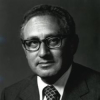Henry A. Kissinger

Henry A. Kissinger
Henry Alfred Kissingeris an American diplomat and political scientist. He served as National Security Advisor and later concurrently as United States Secretary of State in the administrations of presidents Richard Nixon and Gerald Ford. For his actions negotiating the ceasefire in Vietnam, Kissinger received the 1973 Nobel Peace Prize under controversial circumstances, with two members of the committee resigning in protest. Kissinger later sought, unsuccessfully, to return the prize. After his term, his advice has been sought by world leaders...
NationalityGerman
ProfessionStatesman
Date of Birth27 May 1923
CountryGermany
I don't consider China a communist state, no. I know that sounds paradoxical, but it's my view.
In my view, there's no doubt that the Soviets had infinitely greater trouble holding their structure together than we did.
I do not know what will happen in China politically. I do know that it is impossible to maintain the communist system or probably even a strict one-party system when the economy becomes so pluralistic. Now, what form that takes and what institutions will evolve, I do not have a clear view about. I do not think the United States, as a general principle, ought to intervene in this.
For my generation the relationship with Europe was the central point of American foreign policy. Even during my time in government there was disagreement, sometimes very strong disagreement. But they were all like arguments within a family. I am not sure if the generation which doesn't have these experiences has the same view of things.
Statesmen think in terms of history and view society as an organism. Prophets are different since they believe absolute aims can be achieved in the foreseeable future. More people have been killed by crusaders than by statesmen.
I want to get into the President's head some idea of what he can do. If military actions are recommended to him for decision, I want him to know what he is doing when he decides.
Congress can't do much more damage to us than they already have. To this extent we're liberated to do what is right. ... Our successors will be living in a nightmare if we don't do what is right.
an occasion to blow off their frustrations on an issue on which they didn't look as if they are begging (the United States) for help.
a review of withdrawal strategy ... seems in order.
My heart goes out to the president because I've served in an administration that faced a very divided country in a very difficult set of circumstances.
Because of the axiom that guerrillas win if they do not lose, stalemate is unacceptable, ... the military challenge in Iraq is more elusive.
Ninety percent of all politicians give the other ten percent a bad reputation.
I'm confident John Bolton will bring peace to the world before he brings peace to his relations with The New York Times,
We will go where the facts lead us,